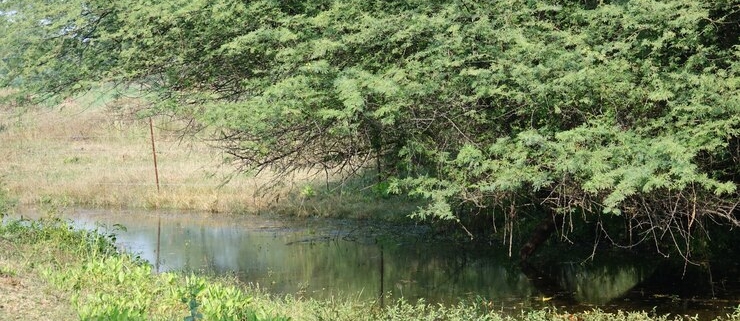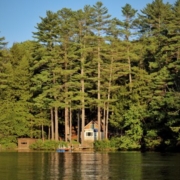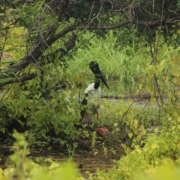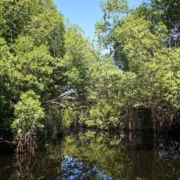Supporting Conservation Efforts: How Your Sundarban Tour from Kolkata Can Make a Difference
Dreaming of a getaway to India’s magnificent Sundarbans, a UNESCO World Heritage Site teeming with diverse wildlife? While you envision thrilling encounters with Royal Bengal tigers and navigating the intricate mangrove waterways, your eco village resort of Sundarban tour from Kolkata can hold even greater significance.
This journey can be more than just an exciting vacation; it can be a powerful tool for conservation. Delve into this guide to discover how your travel choices can directly support the preservation of this breathtaking ecosystem and the local communities who call it home.
We’ll explore how responsible tourism initiatives associated with Sundarban eco tourism from Kolkata are making a positive impact, ensuring this natural wonder thrives for generations to come.

The Importance of Conservation in the Sundarbans Eco Village Resort
The Sundarbans is a unique and diverse ecosystem, boasting a rich biodiversity that includes mangrove forests, saltwater creeks, and a variety of wildlife. This delicate balance is under threat from various environmental pressures, making conservation efforts crucial for the preservation of this natural treasure.
How Your Sundarban Tour Can Support Conservation
By choosing responsible and Sundarban eco tourism from Kolkata, you can directly contribute to the conservation of this remarkable region. Here are some ways your tour can make a difference:
Supporting Local Communities
Picking a local tour operator for your trip to the Sundarbans is more than just having a real experience. It also helps keep the area safe and supports the people who live there. When you choose a local operator, you’re making a choice to help the people who take care of the Sundarbans.
Your support is really important for these communities. It helps them make money in a sustainable way, so they can keep protecting the Sundarbans and make their lives better. Many of these communities rely on eco-tourism to make a living, and your support helps them keep their traditions and protect nature.
Local tour operators know a lot about the Sundarbans and how to take care of it. They can give you great experiences while also being careful about the environment.
When you go with a local tour operator, you help in many ways. Your support helps protect animal homes, keeps different kinds of animals and plants safe, and encourages eco-friendly ways to visit. It also helps pay for projects like planting more mangrove trees, keeping an eye on wildlife, and community efforts to save the Sundarbans.
In short, choosing a local tour operator is good for everyone. You get to have a better, more genuine adventure while also helping the Sundarbans and its people. It’s a nice way to travel responsibly and make a positive difference in the places you go.
Promoting Responsible Tourism
Being responsible when visiting the Sundarbans is super important to keep it safe and beautiful. When we follow some rules, we help protect the animals and plants there.
First, we need to be kind to the animals and not bother them. The Sundarbans has cool animals like tigers, birds, and reptiles. We should watch them from a distance and not try to touch or feed them. This way, they can stay happy and act naturally.
It’s also really important not to leave any trash behind. We should throw our garbage in bins or take it with us when we leave. Litter can make the Sundarbans look messy and hurt the animals if they eat it or get stuck in it.
We should be careful not to disturb the environment too. This means staying on paths and not walking on plants. We shouldn’t pick flowers or take anything from the Sundarbans. By being gentle, we can keep the area safe for plants and animals.
Making too much noise is not good either. Loud sounds can scare the animals and make them stressed. We should try to keep quiet, especially when we see animals.
By following these rules, we can help keep the Sundarbans safe and beautiful for everyone, including animals and plants. It’s our job to take care of this special place so that it stays awesome for a long time.

Participating in Conservation-Focused Activities
Choose a tour that incorporates conservation-focused activities, such as wildlife spotting, mangrove forest exploration, and educational programs that raise awareness about the importance of protecting the Sundarbans.
Choosing Eco-Friendly Accommodations
Opt for eco-friendly accommodations that adhere to sustainable practices, such as energy-efficient lighting, water conservation, and responsible waste management. This helps minimize the environmental footprint of your Sundarban eco tourism.
Conclusion
Your Sundarban eco tourism from Kolkata has the power to make a lasting impact on the conservation of this remarkable natural wonder. By choosing a responsible and eco-friendly tour, you are directly supporting local communities, promoting sustainable tourism practices, and contributing to the preservation of the Sundarbans’ unique biodiversity. Remember, every small action counts, and your responsible tourism choices can help ensure a sustainable future for this UNESCO World Heritage Site.
FAQs
How does my tour contribute to conservation efforts in the Sundarbans?
Your tour directly supports conservation efforts through various means. A portion of your tour fees may go towards funding conservation projects, such as habitat restoration, wildlife monitoring, and community-based initiatives aimed at sustainable livelihoods.
What are some conservation projects that benefit from tourism revenue?
Tourism revenue often supports projects like mangrove reforestation, protection of endangered species like the Royal Bengal Tiger, conservation of bird habitats, and initiatives promoting eco-friendly practices among local communities.
How does my visit help the local communities in the Sundarbans?
Your visit provides income opportunities for local guides, boat operators, homestay hosts, and artisans. This income helps support the livelihoods of local communities, reducing their dependence on activities that may harm the environment, such as illegal logging or poaching.













